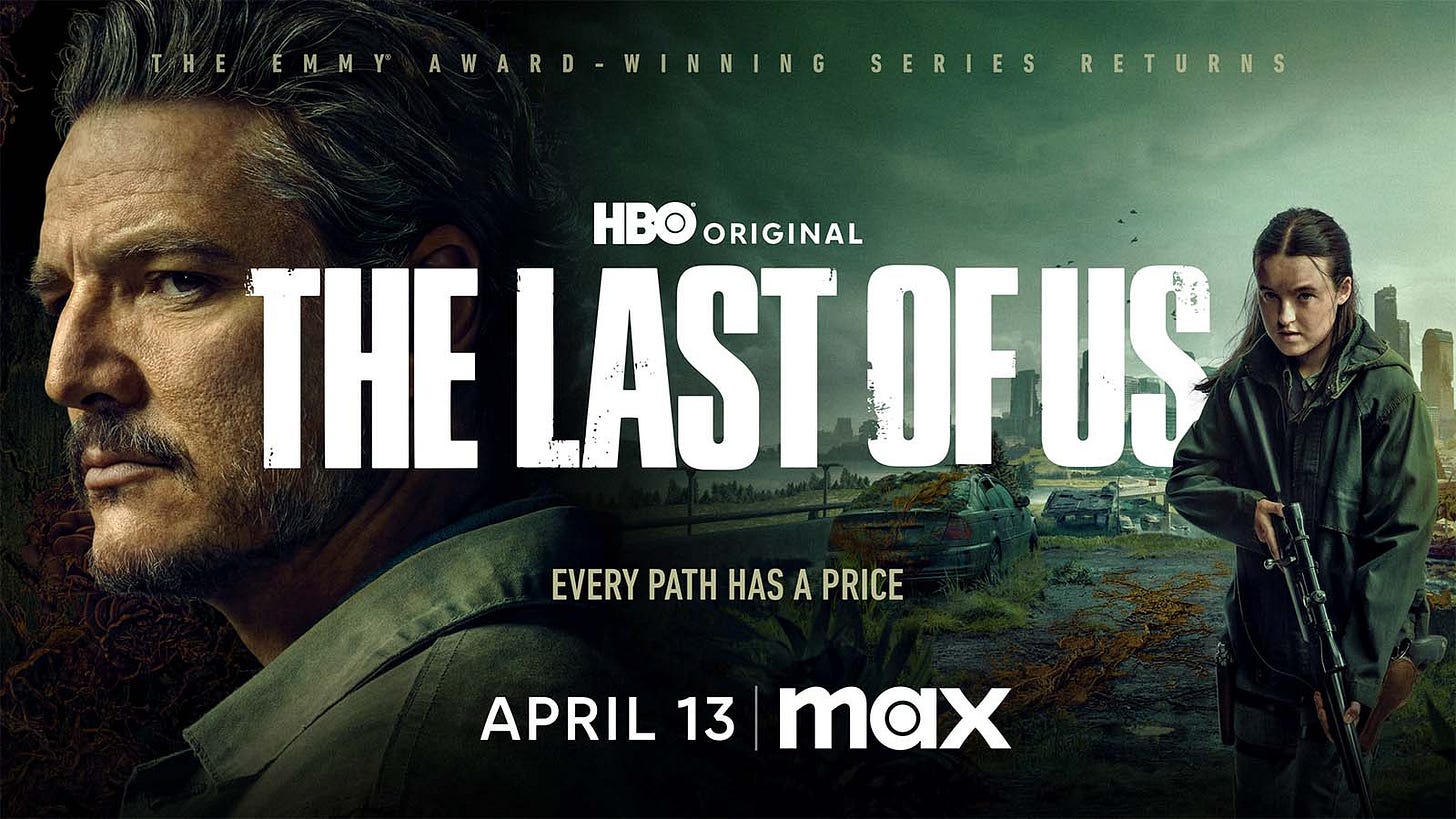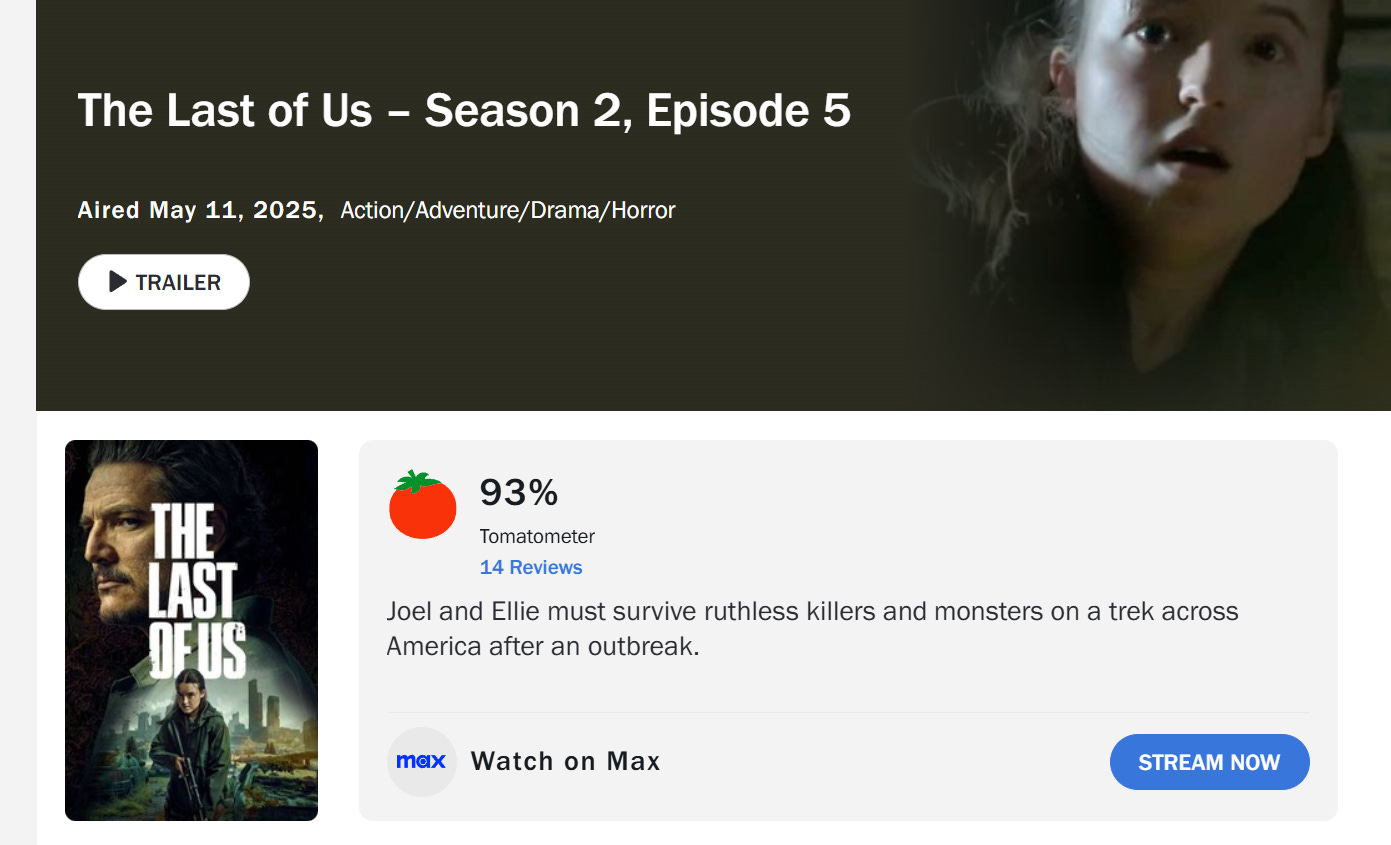The Purpose of a Series is What it Airs
It is erroneous to assign intention to The Last of Us outside its outcome.
Part I
Season 2 of The Last of Us on HBO has been proceeding apace, with its fifth episode airing last night. Having relinquished the hobby of blogging and hating both the first season of the show and, now, its source material, I saw no reason to watch Neil Druckmann’s latest venture into critical acclamation. It would only agitate me.
But I have been following it from a distance, because I was curious on several points. The Last of Us: Part II is a disastrously written game that would have no choice but to be altered in major ways if it were to be adapted successfully into a non-interactive medium. Bella Ramsey is a calamitously cast heroine, who had no chance of playing a sole lead in the series without Pedro Pascal’s companionship. And Abby is an incredulous character, whose presentation would have to be changed if audiences were going to feel anything but hatred toward her.
It still isn’t beyond salvaging. The basic structure of Part II could be saved by a talented writer willing to throw out everything but the characters and the gist of the plot.
Yet doing so would require admitting that the “critical acclaim” that Part II received was, at its core, a lie. It would have taken an acknowledgment that, maybe, the critics had some points after all, and were not simply racists, Nazis, bigots, homophobes, Russian bots (etc.) because they did not like the latest Sony product.
We all could see this already. Neil Druckmann could see it, too. But could his ego take the hit?
The answer is in. Though the critics had their checks clear, the audience is less thrilled:
The audience score on Rotten Tomatoes has been disabled at the time of writing because it dropped too low (shows you who these websites are for, huh?):
Rumors are spreading that viewership has declined steeply. I don’t know what the citations for this are from, but how couldn’t it be true? Killing your lead actor in the first episode usually gets people to tune out.
Though I will forever maintain that Season 1 was a disaster on every level, it’s telling that its audience score, somehow, remains intact. Season 2 must be really bad.
But of course it is. Did you seriously think you could kill off Pedro Pascal and turn Bella Ramsey into a leading woman? Did you think audiences would accept her as the Ellie we see in Part II, which, despite all of its faults, is still carried by a phenomenal performance from Ashley Johnson? Did you think the game that was reviled by at least half of its players and undersold its predecessor by twenty million copies (this link compares only the remaster to Part II, not the original on PS3) would fly on television, because HBO’s audience is so much wiser and more mature than lowly gamers?
Answering yes to any of the above is not rational. Which brings me to the end of my gloating, the point of this essay, and a quote from the cyberneticist Stafford Beer:
[T]he purpose of a system is what it does. This is a basic dictum. It stands for bald fact, which makes a better starting point in seeking understanding than the familiar attributions of good intention, prejudices about expectations, moral judgment, or sheer ignorance of circumstances.
For example if the showrunners were to cast Kaitlyn Dever to represent Abby:
…and Bella Ramsey to represent Ellie:
Then it would be irrational to look for insight into their intentions anywhere other than in the effect that such casting creates. Because the effects are manifold, and the purpose of a show is what it airs.
The Last of Us on HBO is not being made by a few errant writers and actors whose creative intentions might become muddled beneath layers of difficulties working on scripts, on sets, and in an editing room. It is a carefully produced, multi-million dollar television series on one of the world’s largest streaming platforms, wherein no part was created without the review and approval of hundreds of independent minds. Nothing about this series is accidental. Unlike The Last of Us: Part II, which I still believe to be the badly conceived work of an ego-tripping director to whom no one could say no, there is no accidental explanation for this outcome. The Last of Us on HBO was stylistically designed to be this way. The audience reaction is the intended purpose.
The purpose of a system is its what it does. The system created this show.
So what is its purpose?
What It Airs
How might it be possible that the pretty, petite brunette from the game ends up being played by someone with visible Fetal Alcohol Syndrome in the TV show, while the ogrish hulk-woman is cast not only by a pretty, petite brunette—but one with a striking resemblance to the character she opposes in the story?
This was no accident. Neil Druckmann (& friends) chose Bella Ramsey for the role of Ellie because she is not suited for it. She is extraordinarily, distractingly unphotogenic and, more vitally, a bad actress. This is not her fault; this is the fault of the people who put her in the role.
So why did they put her in the role?
The purpose of a series is what it airs.
I can’t speak as to the quality of Kaitlyn Dever’s acting. But she is very photogenic. She looks like a leading woman. Using an actress like her in place of Abby, a character universally derided for her unappealing appearance in the game, suggests that the showrunners are aware of this. It is the live action equivalent of drawing a character with big eyes. Audiences are more disposed to like attractive characters, and predisposed to dislike unattractive ones. Nothing is more fundamental to storytelling than this truism.
What can be inferred about Neil Druckmann’s intentions, that he thus cast one of the ugliest women he could find to play Ellie, and an extremely attractive one to play Abby?
The purpose of a series is what it airs. And what has aired tells us that Druckmann and Mazin wanted to put down and humiliate the first game and its fans, while elevating the second—as much as possible. They want you to hate Ellie and side with Abby. Why else would the adaptation of the first game be so rushed and awkward, trimmed down to ten abridged and actionless episodes, while the second gets expanded into three seasons? The whole entertainment industry is being subjected to one man’s psychodrama over the mixed reception of his supposed masterpiece.
But I think there’s more to it than that. Failing to change Part II’s terrible story and forcing Bella Ramsey into a lead role that she cannot fill was not an accident. If the purpose of a series is what it airs, then we must draw the conclusion that The Last of Us Season 2 on HBO is intentionally designed to destroy The Last of Us as a franchise. It isn’t just “bad,” in the lazy and poorly done way that the first season was bad: it is calculated to be bad, in bizarre, pointless, and easily preventable ways.
And if your goal was to eradicate the first game from memory, would there be any better way to do it than this? If censorship wasn’t an option, if the game had to remain on sale: you would have to resort to the complete demolition of that game’s legacy. Right?
I’m not suggesting that this was Neil’s only way of taking the first game away from you. But the purpose of a series is what it airs.






